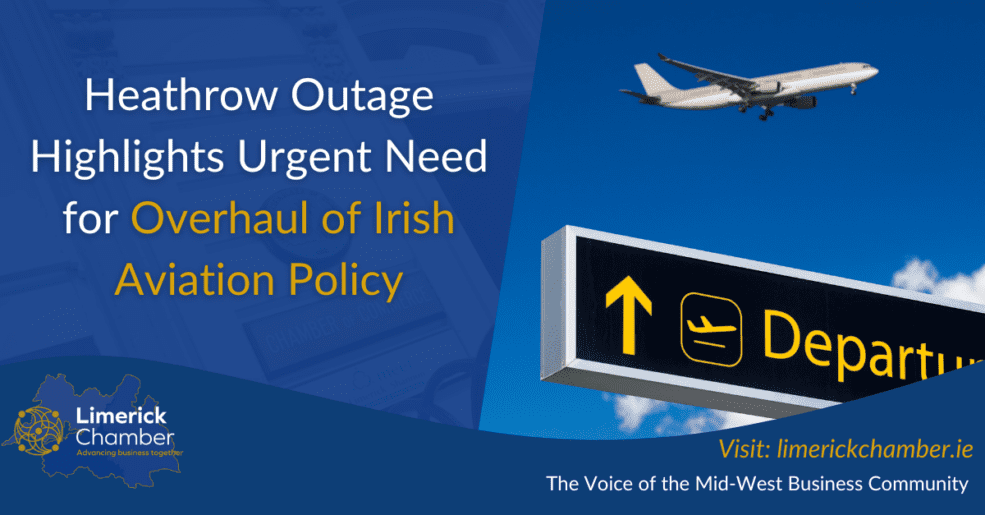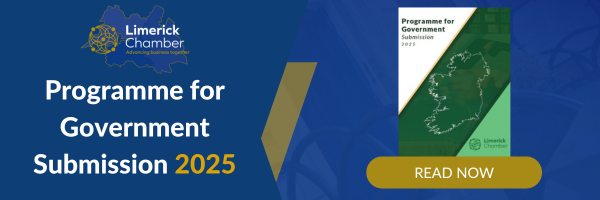Limerick, 27 March – The recent power outage at Heathrow Airport, which caused widespread disruption to over 250,000 passengers, serves as a stark warning for Ireland’s aviation industry. Limerick Chamber is urging the Irish Government to take immediate action to decentralise air traffic and maximise the potential for underutilised regional, state-owned airports to strengthen national security and serve the needs of passengers.
Currently, Dublin Airport handles the vast majority of Ireland’s air traffic, accounting for 85% of scheduled passengers in 2024. This heavy reliance on one airport creates a vulnerability to major disruptions in the event of an outage, technical failure, or security incident. A similar situation in Dublin-like the one that occurred at Heathrow – could cripple Ireland’s connectivity, affecting business, trade, and tourism. Decisions by successive Irish Governments as well as regulators and planners have allowed our country to sleepwalk into a situation where we have a single point of failure that could have catastrophic effects on our economy.
Limerick Chamber have long advocated for diversification of Ireland’s aviation industry by better utilising state-owned regional airports, highlighting the unique selling points of Shannon Airport in particular; with the longest runway in the country, capable of handling every type of aircraft, operating 24/7 without noise restrictions. Outside of Dublin airport it is the only airport in Europe offering US Customs and Border Protection (CBP). With the largest terminal capacity outside of Dublin Airport and expansive airfield infrastructure, it has potential for future growth without the need for significant infrastructure investment.
“Not only is the concentration in Dublin a single point of failure, but it also fails to serve the needs of passengers” said Michelle Gallagher, CEO of Limerick Chamber. “The reality is that nearly 40% of visitors landing in Dublin want to go to the regions, while 60% of the population reside outside of Dublin. Policymakers need to look holistically at what the island needs, and what the flying public want. Ironically, the runways at Dublin Airport are the new compulsory stopover, as passengers who want to travel to the regions are landed there and those passengers who have an airport closer to them have no choice but to travel to Dublin. Policymakers must act to serve the needs of passengers”.
“The Heathrow outage has exposed the risks of over-centralisation in aviation,” said Mrs. Gallagher “Ireland must act now to safeguard our connectivity and resilience. Regional airports such as Shannon and Cork have the capacity and infrastructure to handle a greater share of air traffic, enhancing both national resilience and security. “
“Airports have contingency plans, but national policy must ensure a resilient and balanced Irish aviation network. Policymakers can mitigate the risks associated with over-centralisation and build a robust aviation market which would enhance passenger convenience and economic development but also provide a crucial safeguard against unforeseen disruptions. The renewed National Aviation Policy must ensure that Ireland’s connectivity is not concentrated at a single airport but considers the needs for the country as a whole and supports balanced economic development and achieving our Climate Action targets”
Limerick Chamber warns that failure to address the imbalance between Dublin and regional airports could expose Ireland to significant economic and security risks.
“This is not just an issue of economic and regional development; it’s a national security concern” said Seán Golden, Chief Economist and Director of Policy at Limerick Chamber.
“The current National Aviation Policy was published in 2015. Given the current tumultuous international environment, it is inappropriate to be running an industry on a policy from ten years ago. There is a commitment in the Programme for Government to renew the National Aviation Policy and this must be prioritised. Government must act now to build resilience and diversification in our aviation network before an incident forces our hand”.
Golden further emphasised the need for broader infrastructure diversification: “Last year, Storm Darragh severely disrupted the British and Irish supply chain due to damage at Holyhead Port. This heavily impacted supply chain in the busy Christmas period. Failure to adequately plan and diversify our infrastructure, especially infrastructure that is exposed to changing climate change conditions, will provide serious challenges to Ireland in the coming years. We must act now and update our National Aviation Policy to reflect goals and challenges of the day”
Follow Limerick Chamber on social media for more insights
![]() LimerickChamber
LimerickChamber
![]() Limerick Chamber
Limerick Chamber
![]() Limerick_Chamber
Limerick_Chamber
![]() Limerick.Chamber
Limerick.Chamber



